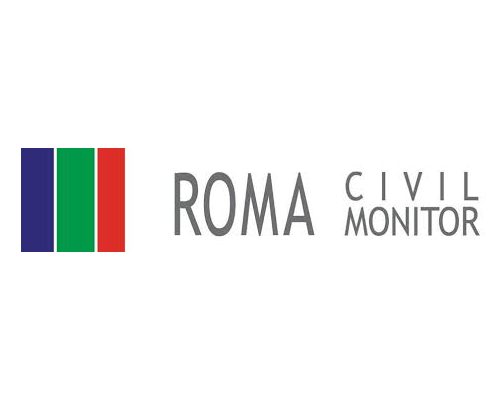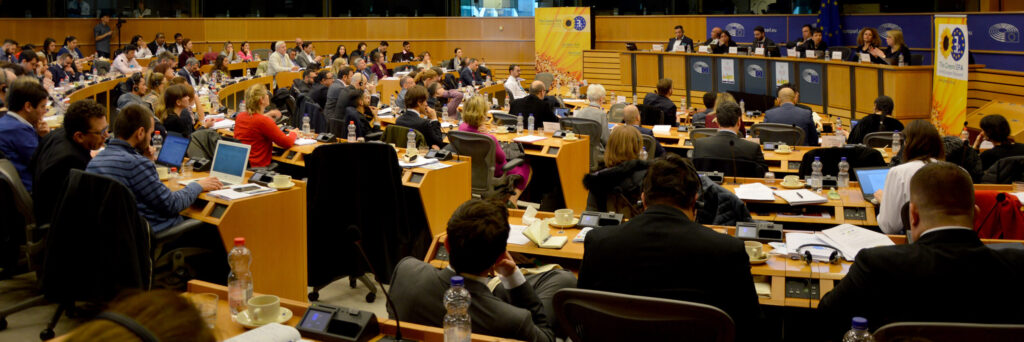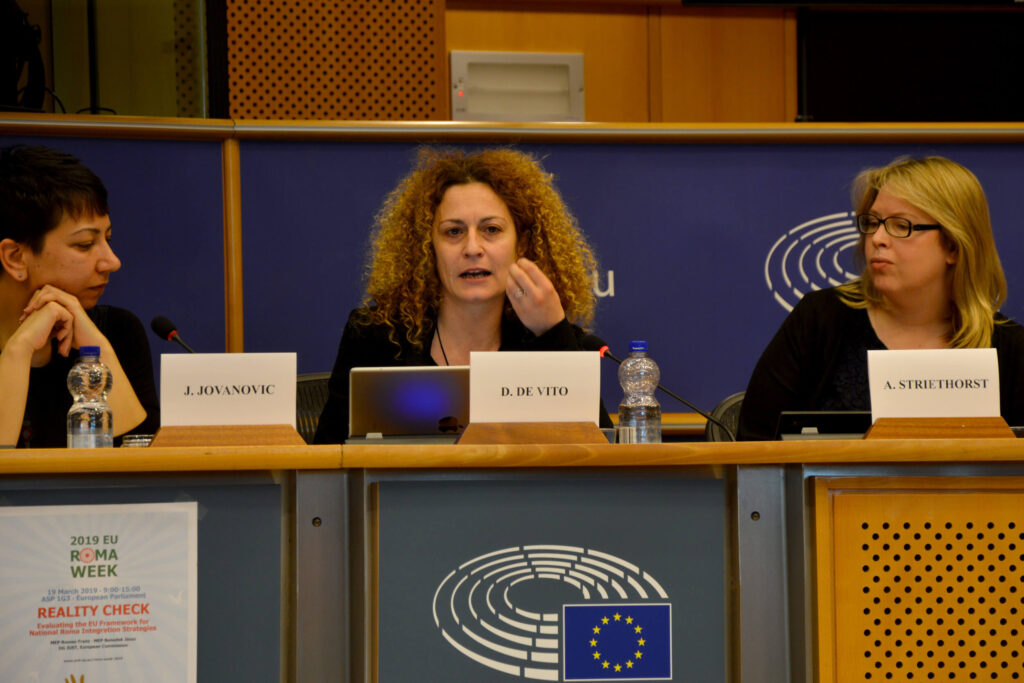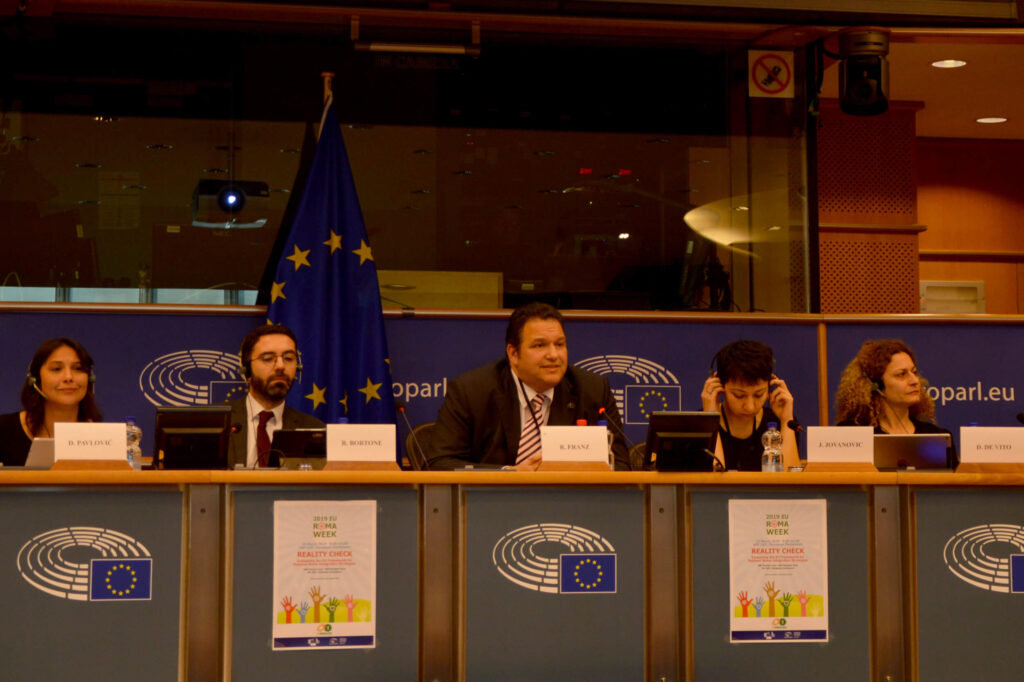- PROJECT COMPLETED
ROMA CIVIL MONITOR IS THE MONITORING REPORT OF CIVIL SOCIETY THAT AIMS TO UNDERSTAND HOW ROMA PEOPLE LIVE IN EUROPE. THE ITALIAN RESEARCH IN 2017-2020 WAS COORDINATED BY CASA DELLA CARITÀ.

A continental initiative, by civil society, with the support of institutions, to understand how Roma people live in Europe and how well policies work in their favor, at community and national level.
ROMA Civil Monitor is a multi-year European project that involves 27 states, is coordinated by the Hungarian Central European University and is financed by the European Commission (DG JUSTICE).
It is being carried out in the field by over 100 civil society organisations , including the Casa della Carità , the leader of Italian research.
READ THE ROMA CIVIL MONITOR
A MONITORING REPORT OF CIVIL SOCIETY
The Foundation coordinated the monitoring work of the national strategy for the inclusion of Roma, Sinti and Caminanti, together with Consorzio Nova, Fondazione Romanì, Associazione 21 Luglio, Arci Solidarietà Onlus and Associazione Roma Sinti Prato.
For Casa della Carità, engaged in paths of accompaniment and autonomy for the weakest sections of the Roma population in Milan and Lombardy since 2005, this is an important project, which confirms its choice to combine social and cultural activities , going to deepen and study at a national and European level those issues that see it concretely involved every day.
INSUFFICIENT POLICIES
Unfortunately, however, the first results of ROMA Civil Monitor, both at European and national level, are not positive. Of the approximately 10 million Roma living in the European Union, too many still find themselves in undignified conditions of exclusion . And the policies to change the situation are struggling to do so.
As regards the European Union as a whole, the EU framework for national Roma integration strategies up to 2020, despite calling improving the living conditions of Roma “a social and economic imperative for the Union and its member states ” , failed to improve their living conditions.

As emerged during the presentation of the first year of the report to the European Parliament, the situation is very different from country to country : on the one hand, the topic has entered the continental agenda, there is more transparency and responsibility, structures and processes have been created governments and some initiatives have been launched. On the other hand, however, the framework lacks formalism, very little is known about the results obtained with the funds spent and the actions implemented have limited capacity, effectiveness and sustainability.
THE ITALIAN CASE
As regards our country, it must be recognized that the National Strategy for the inclusion of Roma, Sinti and Caminanti was an important milestone, it constitutes an excellent reference for intervening on issues such as anti-discrimination, social and housing inclusion, education and health. Nonetheless, 8 years after its approval in 2012, there are still 25 thousand Roma living in mono-ethnic camps, in conditions of severe segregation and exclusion and the 2020 deadline – set to evaluate its impact – will probably be reached without having registered significant results about.
The figure is the result of the delays with which the Regions moved in the application of the National Strategy . Only 11 regions out of 20 have convened the working tables dedicated to the implementation of the Strategy itself and, among these, only Emilia Romagna has passed a regional law, with specific funds, to overcome the camps. This is a positive exception that contrasts with the inaction of Lazio and Lombardy, the two regions with the largest number of Roma in Italy, 22% and 11% respectively: in Lazio the consultations only started in 2015, while in Lombardy they have not yet been organised.

To date, therefore, the national strategy for the inclusion of Roma, Sinti and Caminanti (RSC) is a missed opportunity . The reasons are the poor coordination between the different institutional levels, the lack of political will and the limited powers of UNAR, the National Anti-Racial Discrimination Office, which is responsible for the application of the Strategy but does not have a specific budget and does not have the power to sanction non-compliant Regions.
Among the recommendations suggested by the report, there are therefore the strengthening of the UNAR mandate and the definition of a clear timetable, which binds all the Regions where the regional or local Operational Tables must be created. Another important issue is that of resources : the Strategy should in fact be provided with adequate resources from the State budget, the allocation of which must give priority to the regions with a higher number of RCS. It would then be necessary to promote the inclusion of RSC populations in universalistic socio-political programs against poverty and social exclusion .
AN INCREASINGLY HOSTILE CONTEXT
At the same time, institutional shortcomings are also the result of a public and political debate increasingly marked by anti-Gypsyism , the racism towards Roma that fuels prejudice, discrimination and hate crimes.
Precisely for this reason, full recognition by law of the RSC communities as a linguistic minority would be important and several proposals already exist in this regard . The approval of new legislation would have a symbolic but also important instrumental value, to combat discrimination and thus strengthen inclusion paths.

It would also be fundamental to invest in the promotion of Roma and Sinti culture, focusing on counter-discourse and narrative campaigns, rather than on extemporaneous events . This task cannot be completed by UNAR alone: a more important involvement is requested from the Ministry of Education, University and Research (MIUR) and the Ministry of Cultural Heritage.
The MIUR, together with the relevant publishers, should urgently review primary and secondary school texts to remove any anti-Gypsy stereotype and promote the culture of Roma and Sinti. In this regard, the genocide of Roma and Sinti should be commemorated on Remembrance Day (Law no. 11 of 2000) and the MIUR should work towards the inclusion of references to Italian concentration camps and Porrajmos in textbooks.
Learn more
Read the impact report “Casa della Carità and Roma families”.